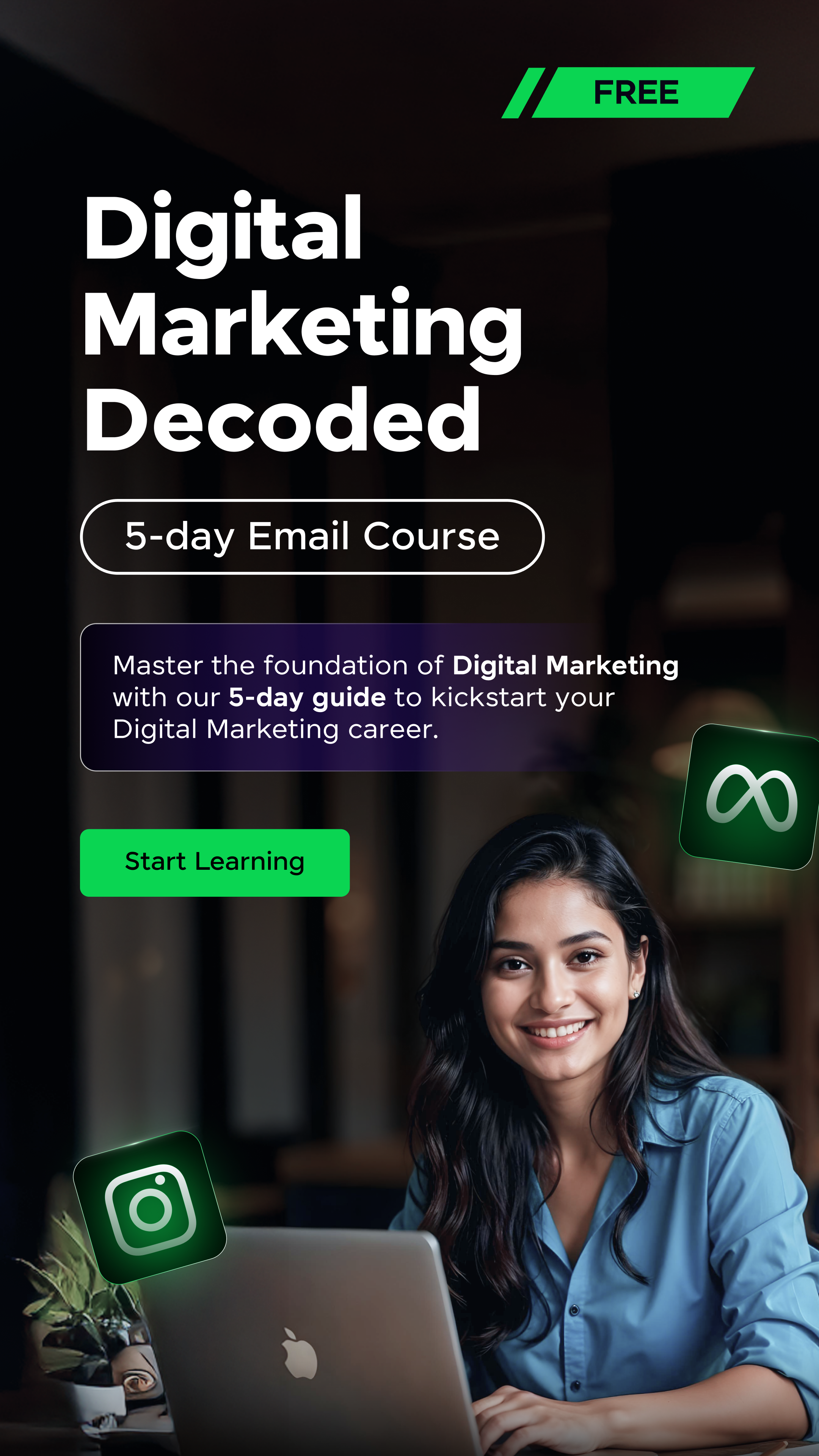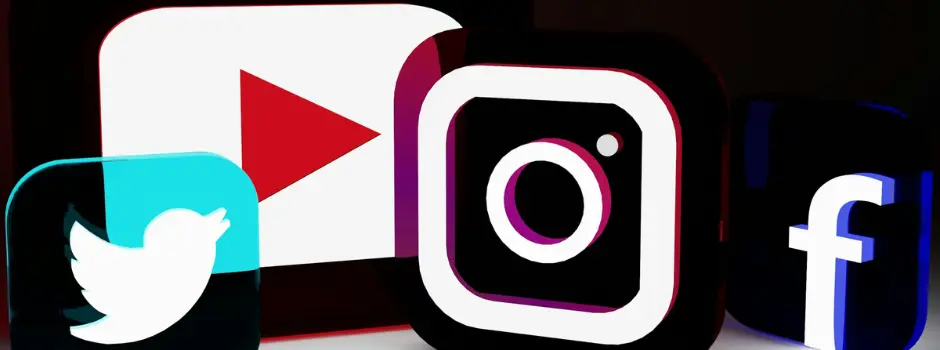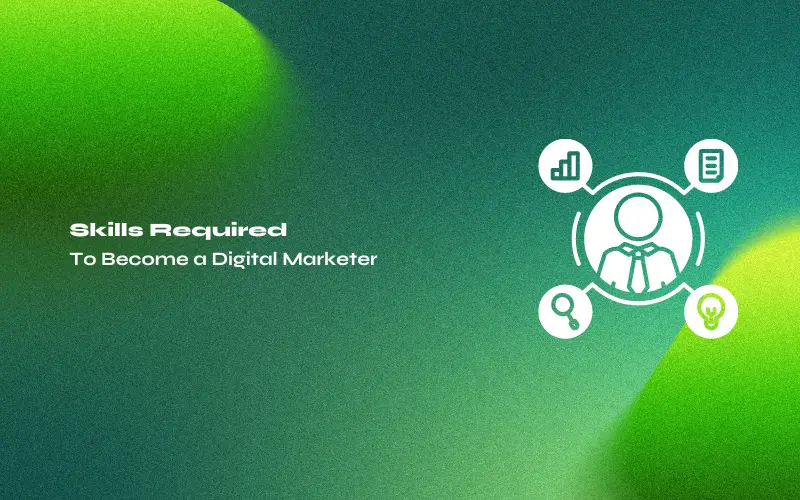
Top 15 Growth Marketing Strategies for 2025
Jan 16, 2025 7 Min Read 4138 Views
(Last Updated)
In the ever-evolving digital landscape of 2025, businesses constantly seek effective strategies to fuel growth and expand their reach. This is where growth marketing comes into play. Growth marketing goes beyond traditional marketing tactics, focusing on scalable and sustainable growth through various channels such as digital marketing, social media marketing, and more.
In this blog, we’ll explore 15 top growth marketing strategies that work in 2025, aimed at beginners looking to kickstart their growth marketing journey.
Table of contents
- What is Growth Marketing?
- 15 Growth Marketing Strategies That Work in 2025
- Customer-centric Campaigns
- 2. AI-Powered Personalization
- Voice Search Optimization
- Focus More on Videos
- Leverage the potential of User-Generated Content
- AI tools for content Generation
- A well-executed SEO
- Paid Advertising on Social Media
- Shoppable Social Media Posts
- Focus on Partnerships & Influencer Marketing
- Affiliate Marketing
- Build Communities
- Social Selling
- Omnichannel Marketing
- Leveraging Data Analytics:
- Wrapping Up
- FAQs
- What is growth marketing?
- How important is engagement in growth marketing?
- What is SMO?
- What are some best practices for email marketing in growth strategies?
- What is a marketing growth strategy?
What is Growth Marketing?
Growth marketing is a strategy that accelerates a company’s growth by employing various marketing tactics and techniques that prioritize experimentation, data analysis, and iterative improvements. Unlike traditional marketing approaches that often rely on fixed strategies and channels, growth marketing is highly dynamic and adaptable, aiming to identify and exploit opportunities for rapid expansion.
Before we move to the next part, Gain a deeper knowledge of business analytics and digital marketing concepts. You can consider enrolling yourself in GUVI’s Business Analytics and Digital Marketing Course, which lets you gain practical experience by developing real-world projects and covering technologies including Power BI, Excel, SQL, Tableau, Data Visualization, etc.
Additionally, if you would like to explore Marketing Research Techniques through a Self-paced course, try GUVI’s Marketing Research Techniques certification course.
15 Growth Marketing Strategies That Work in 2025
Keeping customers at the forefront of your growth marketing strategy is a way to success. Here are 15 strategies that will keep you going toward your growth marketing success.
1. Customer-centric Campaigns
The customer-centric approach in any marketing campaign is a win-win. It benefits both customers and businesses. So, before diving into any growth marketing strategy, it’s crucial to understand your audience thoroughly.
Who are they? What are their pain points? What channels do they frequent? Conducting thorough audience research using tools like Google Analytics, social media insights, and customer surveys can provide invaluable insights to tailor your marketing efforts effectively.
Explore: The Influence of Chatbots on Customer Services: Benefits and Impact
2. AI-Powered Personalization
AI-powered personalization is a cutting-edge strategy that leverages artificial intelligence (AI) algorithms to deliver highly tailored and relevant experiences to individual users. In growth marketing, personalization has emerged as a powerful tool for driving engagement, increasing conversions, and fostering customer loyalty. So does AI-powered personalization. It makes the job smarter and easier.
AI-powered personalization involves the use of machine learning algorithms to analyze vast amounts of user data and predict individual preferences, behaviors, and interests. By harnessing the power of AI, marketers can create personalized experiences across various touchpoints, including websites, emails, mobile apps, and advertisements.
Also, Personalized recommendations and targeted messaging can significantly improve conversion rates by presenting users with products or services that align with their interests and preferences.
Must Know About 7 Benefits of AI-Powered Learning Environments
3. Voice Search Optimization
With the increasing prevalence of voice-activated devices like smart speakers and virtual assistants (Siri, Alexa), more people are using voice search to find information, conduct searches, and perform tasks hands-free. Businesses need to adapt to this paradigm shift in consumer behavior to remain visible and relevant to their target audience.
Introduce a conversational tone in your content and ensure that your website is voice-search optimized. To optimize for voice search, businesses should understand and cater to the long-tail, conversational queries, which often reflect users’ intent and context more accurately.
Voice search often relies on featured snippets or “position zero” results, which are concise answers displayed at the top of search engine results pages (SERPs). By optimizing content to appear as featured snippets, you can increase your brand’s chances of being selected as the voice search answer. This will help you stay visible, relevant, and competitive in an increasingly voice-driven digital landscape.
Read More: Top 15 B2B Digital Marketing Strategies in 2025 [Updated]
4. Focus More on Videos
Video content tends to capture and retain viewers’ attention more effectively than text or static images. With the rise of shorter attention spans, videos offer a more engaging and immersive experience, making it easier for businesses to convey their message and connect with their audience.
In 2025, video marketing will skyrocket among all the marketing efforts you make, it will continue to be a dominant and highly effective strategy for engaging your target audience. Especially, innovative short-form videos, live streams, reels, User-generated videos, 360-degree videos & more will hit the sweet spot.
Videos enable businesses to convey complex information and ideas more effectively through visual storytelling. Whether it’s demonstrating product features, sharing customer testimonials, or explaining concepts, videos offer a dynamic and engaging way to communicate with audiences.
A recent report from Hubspot says that 73% of consumers prefer to watch a short-form video to learn about a product or service. Short video spaces, amongst all, have a huge opportunity for your business. So grab it right away!
Must Explore: AI Video Revolution: How the Internet is Forever Changed [2025]
5. Leverage the potential of User-Generated Content
Word-of-mouth is the star of marketing in any competitive market. User-generated content is nothing but the means of securing the word-of-mouth and positive experiences of your customers in content formats like text, audio, or video and showcasing them to potential target audiences.
User-generated content reflects the experiences and perspectives of real customers and not celebrities or ambassadors, making it highly relatable to other potential customers. When consumers see people like themselves using and endorsing a product or service, they are more likely to identify with the content and see its relevance to their own lives.

Businesses have already started to leverage textual testimonials and ratings of their products and services in landing pages, newsletters, blogs, etc. So, 2025 is your year to make captivating videos that feature happy and satisfied customers who have benefitted from your business.
User-generated videos are more lively and carry a great amount of authenticity and genuineness as they feature real customers. Over 50% of marketers believe that user-generated videos yield a higher return on investment. They are also cost-effective compared to the efforts involved in creating the branded ones from scratch!
Read More: 8 Steps to Make an Effective Digital Marketing Plan
6. AI tools for content Generation
More than 80% of marketers worldwide integrate some form of AI into their marketing activities. In 2025, marketers should fine-tune the use of AI for automation, content generation, analyzing data, and more.
For instance, while using AI tools for content generation, marketers should mindfully leverage AI with a human touch. A 100% AI-generated content could not empathize with your target audience as a marketer does, resulting in poor engagement rates. Seek ideas and trends from AI and start aligning them with your brand. Make more meaningful marketing efforts by showcasing the real values of the brand and how it empathizes with customers.

Similarly, AI algorithms can forecast future trends, behaviors, and outcomes based on documented data and patterns. Here, marketers should align their conclusions based on data with AI’s predictive analysis to effectively anticipate market shifts, identify opportunities, and mitigate risks. This combined approach will enable you to proactively adjust your strategies to stay ahead of the rising competition.
7. A well-executed SEO
SEO should always top the to-do list of any growth marketer because the benefits are significantly huge. A well-executed SEO strategy is essential for businesses to increase visibility, attract high-quality traffic, enhance user experience, build credibility and trust, achieve cost-effective marketing results, ensure long-term sustainability, gain a competitive advantage, and adapt to changing trends in the digital landscape. Investing in SEO is not only beneficial for short-term gains but also critical for the long-term success and growth of a business online.

Unlike paid advertising, organic traffic generated through SEO tends to be of higher quality as it is driven by users actively searching for specific products, services, or information related to the business. This results in higher conversion rates and a greater likelihood of turning visitors into customers.
Compared to traditional advertising channels such as print, radio, or TV, SEO is a cost-effective marketing strategy with a high return on investment (ROI). Once a website achieves high rankings in search results, it can continue to attract organic traffic and generate leads and sales with minimal ongoing investment.
Read More: 16 Types of Digital Marketing: Best Mediums For 2025
8. Paid Advertising on Social Media
If you want to reap the benefits of social media marketing efforts, really fast then you’ll have to consider social media advertising for your business. Social media advertising is an indispensable component of digital marketing strategies, offering unparalleled reach, targeting capabilities, and measurability for businesses of all sizes.

While organic reach on social media is valuable, paid advertising can help amplify your efforts and reach a larger audience. Platforms like Facebook Ads, Instagram Ads, and LinkedIn Ads offer robust targeting options to ensure your ads are seen by the right people.
Invest in targeted ad campaigns to promote your products/services, boost brand awareness, and drive conversions. Monitor your ad performance and make adjustments as needed to maximize your return on investment.
Must Read: Paid Advertising Vs Content Marketing: A Detailed Comparison
9. Shoppable Social Media Posts
Shoppable social media posts will remain a highly effective strategy for driving direct sales and enhancing the overall shopping experience on social media platforms in 2025 and beyond. By leveraging direct purchase options of social platforms into social media posts, brands can capitalize on impulse buying behavior and capitalize on the moment of inspiration when users are most engaged with their content.
Most social media platforms, like Instagram and Facebook, enable you to tag products within your posts. Tagging allows users to tap on specific items and get more information or proceed to purchase.
Shoppable posts eliminate barriers to conversion and provide a frictionless shopping experience, leading to higher conversion rates and increased sales. Shoppable social media posts provide valuable data and insights into consumer behavior, preferences, and purchasing patterns.
Brands can track metrics such as click-through rates, conversion rates, and average order value to optimize their social media campaigns, refine their targeting strategies, and tailor their product offerings to meet the needs and preferences of their audience.
You might Like: 8 Best YouTube Channels to Learn Digital Marketing 2025
10. Focus on Partnerships & Influencer Marketing
Co-create content with popular brands and invite influencers to endorse your brand. Partnering with big brands in your industry lets you tap into their audience base.
This can help you invite more potential customers for your brand. Innovate ideas for collaborating with these people. For instance, while speaking about partnerships, you can invite industry leaders to be the guests for your podcast show and you can exchange conversations on current industry trends. This practice will bring in a good engagement rate and a nicer audience base.

Influencer marketing is also popular for the same reason. You get to reach a wide audience by collaborating with industry-specific or like-minded influencers. The user-generated content approach is popular and rewarding in terms of influencer marketing.
Here, you let the influencer experience your brand and then endorse it, which sounds like a winning race already! Particularly in 2025, micro and nano influencers with comparatively less but loyal follower bases will be in demand. So, the trick lies in choosing the right and appropriate influencers to nurture your brand.
Also Read: Best Way to Learn Digital Marketing in 2025
11. Affiliate Marketing
Affiliate marketing operates on a performance-based model, where businesses only pay for actual results, such as sales or leads generated through affiliate referrals. This makes it a cost-effective advertising strategy, as businesses are only investing in marketing efforts that deliver tangible outcomes, rather than paying for ad placement or impressions with no guarantee of results.

By partnering with affiliates, businesses can tap into their networks and leverage their existing audience base to reach new and highly targeted segments. Affiliates often have niche expertise or a specific demographic following, allowing businesses to expand their reach and connect with potential customers who may not have been reached through traditional marketing channels.
If you are still wondering how affiliate marketing works, it is high time you know the process. An affiliate promotes the product/service in their community, website, and acquaintances. Then, the prospects will click and convert. The company pays off for his/her conversions. It is as simple as that.
Also Read: Best Digital Marketing Tools in 2025 [With Bonus AI Tools]
12. Build Communities
Building a community around your brand fosters deeper connections with your customers. By providing a platform for engagement and interaction, businesses can cultivate a loyal customer base that is emotionally invested in the brand and its offerings.

A strong community often leads to passionate advocates who are eager to spread the word about your brand. These advocates can become powerful ambassadors, recommending your products or services to their networks and driving word-of-mouth referrals, which are highly trusted and influential.
Communities also serve as a valuable resource for customer support, allowing businesses to address inquiries, resolve issues, and provide assistance on time. By engaging with customers directly within the community, businesses can build stronger relationships and demonstrate their commitment to customer satisfaction.
Must Know About Brand Storytelling in the Digital Age: Creating Compelling Content from Scratch
13. Social Selling
Social selling is a sales strategy that leverages social media platforms to connect with prospects, build relationships, and ultimately, drive sales. Unlike traditional sales tactics that rely heavily on cold calling and email outreach, social selling focuses on using social networks as a means to engage with potential customers in a more personalized and authentic manner.
Instead of focusing solely on pitching products or services, social sellers prioritize providing value to their audience. They share informative content, offer insights and expertise, and participate in relevant conversations to position themselves as trusted advisors and thought leaders in their industry.
Social sellers actively monitor social media channels to listen to conversations, identify relevant opportunities, and understand the needs and pain points of their target audience. By listening attentively, they can tailor their messaging and approach to address specific challenges and interests.
Also Explore: Best Digital Marketing Webinars and Workshops
14. Omnichannel Marketing
Omni-channel marketing refers to the practice of integrating and aligning various marketing channels (online & offline) and touchpoints to provide a seamless experience for customers across multiple platforms and devices.
One of the primary benefits of omni-channel marketing is the ability to provide customers with a consistent and cohesive experience across all touchpoints. Whether they interact with your brand through your website, mobile app, social media, email, or in-store, customers receive a unified and seamless experience that enhances satisfaction and builds brand loyalty.
Omni-channel marketing enables businesses to map out and optimize the entire customer journey from awareness to conversion and beyond. Also, Omni-channel marketing provides businesses with greater visibility into the performance of their marketing efforts across various channels.
By tracking customer interactions and attributing conversions to specific touchpoints, businesses can accurately measure the ROI of their marketing campaigns and allocate resources more effectively to channels that drive the highest return on investment.
Must Explore: 6 Reasons Business Analytics Makes Digital Marketing Powerful
15. Leveraging Data Analytics:
Data is the backbone of growth marketing. Leveraging data analytics is paramount for growth marketers to gain a deep understanding of audience behavior, measure campaign effectiveness, identify optimization opportunities, personalize the customer experience, leverage predictive insights, and drive continuous improvement and iteration.

By harnessing the power of data-driven insights, marketers can make informed decisions, optimize their strategies for maximum impact, and achieve their growth objectives in today’s dynamic and competitive digital landscape.
Know More About Top 8 Data Analytics Skills: A Comprehensive Guide to Thrive in the Industry
Wrapping Up
Growth marketing in 2025 is ripe with opportunities for businesses to thrive and expand. Embrace the evolving trends, harness the power of technology, and remain committed to driving meaningful growth with the top strategies discussed in this blog. These strategies will foster long-term relationships and sustainable success for your business in the years ahead.
Kickstart your career by enrolling in GUVI’s Business Analytics and Digital Marketing Course where you will master technologies including Power BI, Excel, SQL, Tableau, and Data Visualization, and build interesting real-life business-analytics projects.
Alternatively, if you want to explore Marketing Research Techniques through a Self-paced course, try GUVI’s Marketing Research Techniques certification course.
Also Explore: Digital Marketing Best Practices for 2025
FAQs
Growth marketing focuses on scalable and sustainable strategies to drive business growth, leveraging data-driven insights, experimentation, and optimization across various marketing channels.
Engagement plays a crucial role in growth marketing as it indicates the level of interaction and interest from your audience, ultimately driving brand awareness, loyalty, and conversions.
SMO stands for Social Media Optimization. It involves optimizing a website or content for social media platforms to increase visibility, engagement, and traffic. It focuses on enhancing the shareability of content across social networks, improving social media profiles, and encouraging interaction with users.
The goal of SMO is to amplify brand presence on social media, drive website traffic, and improve overall online visibility and reputation.
Some best practices for email marketing in growth strategies include segmenting your email list, personalizing your messages, optimizing for mobile devices, and testing different subject lines and content formats.
A marketing growth strategy is a plan or approach designed to increase a company’s market share, revenue, or customer base over time. It typically involves leveraging various marketing tactics and channels to attract new customers, retain existing ones, and drive overall business growth.


























![Best Digital Marketing Courses [Free + Paid] 15 Best Digital Marketing Courses](https://www.guvi.in/blog/wp-content/uploads/2023/09/Best-Digital-Marketing-Courses.png)



Did you enjoy this article?